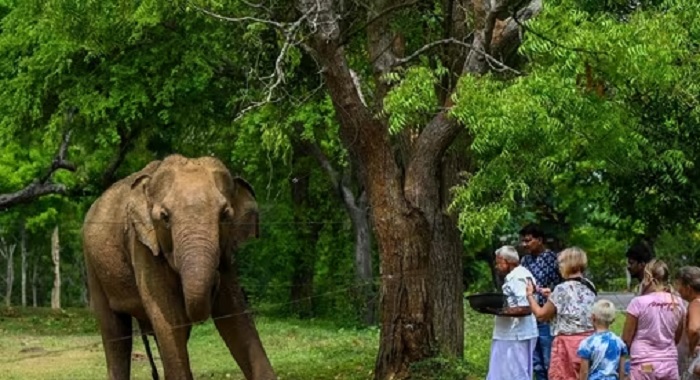Climate Change Reshapes The African Workforce: Challenges And Opportunities

Table of Contents
The Challenges of Climate Change on the African Workforce
The effects of climate change are profoundly impacting the African workforce, posing significant challenges across various sectors. Understanding these challenges is the first step towards developing effective adaptation strategies.
Agricultural Impacts and Food Security
Agriculture is the backbone of many African economies, employing a large percentage of the workforce. However, climate change is severely impacting agricultural productivity and food security. Droughts, floods, and desertification are becoming increasingly frequent and intense, leading to:
- Reduced crop yields: Erratic rainfall patterns and extreme temperatures negatively affect crop production, leading to food shortages and reduced income for farmers.
- Livestock losses: Water scarcity and extreme heat significantly impact livestock health and productivity, causing significant economic losses for pastoral communities.
- Rural-urban migration: As rural livelihoods become unsustainable, people are forced to migrate to urban areas in search of better opportunities, often leading to overcrowding and unemployment in cities.
- Increased food insecurity: Reduced crop yields and livestock losses contribute to widespread food insecurity, impacting the health and well-being of the population and hindering economic development.
- Displacement: Extreme weather events like floods and droughts can displace entire communities, forcing them to leave their homes and livelihoods behind.
These challenges necessitate a shift towards climate-resilient agriculture, focusing on drought-resistant crops, improved water management techniques, and sustainable farming practices to safeguard the agricultural workforce and ensure food security.
Water Scarcity and its Workforce Implications
Water scarcity is another major consequence of climate change, impacting various sectors reliant on water resources. The implications for the African workforce are far-reaching:
- Decreased productivity: Water shortages reduce agricultural yields, limit industrial output, and hinder the productivity of various sectors like fisheries and tourism.
- Water conflicts: Competition for scarce water resources can lead to conflicts between communities and nations, destabilizing regions and disrupting economic activities.
- Health issues: Lack of access to clean water contributes to waterborne diseases, impacting worker health and productivity.
- Job losses in water-dependent sectors: Reduced water availability leads to job losses in sectors like agriculture, fisheries, and tourism, exacerbating poverty and unemployment.
Addressing water scarcity requires implementing sustainable water management practices, investing in water infrastructure, and promoting water conservation at both individual and community levels. Developing drought-resistant crops is also crucial for mitigating the impact of water scarcity on the agricultural workforce.
Increased Frequency of Extreme Weather Events
The increasing frequency and intensity of extreme weather events like cyclones, floods, and droughts pose a direct threat to the African workforce:
- Loss of lives and livelihoods: Extreme weather events can cause significant loss of life and damage to property, devastating livelihoods and disrupting economic activity.
- Damage to infrastructure: Cyclones and floods can damage vital infrastructure like roads, communication networks, and power grids, hindering economic activity and hindering access to essential services.
- Displacement: Extreme weather events force people to flee their homes, leading to displacement and disrupting their ability to work and earn a living.
- Economic losses: The economic costs of extreme weather events are substantial, impacting businesses, governments, and individuals alike.
Strengthening disaster preparedness, investing in climate-resilient infrastructure, and developing effective early warning systems are crucial steps in mitigating the impact of extreme weather events on the African workforce.
Health Impacts and Reduced Productivity
Climate change is also impacting the health of the African workforce, leading to reduced productivity:
- Increased absenteeism: Climate-related diseases like malaria and heatstroke cause increased absenteeism from work, reducing overall productivity.
- Reduced work capacity: Extreme heat can significantly reduce a worker's ability to perform strenuous tasks, leading to lower output and decreased efficiency.
- Healthcare costs: Increased incidence of climate-related diseases increases healthcare costs, placing a burden on individuals and healthcare systems.
- Loss of skilled labor: Illness and death due to climate-related causes can lead to a loss of skilled labor, hindering economic development.
Investing in healthcare infrastructure, improving access to healthcare services, and promoting health awareness are crucial for mitigating the health impacts of climate change and maintaining a healthy and productive workforce.
Opportunities for Adaptation and Resilience
While climate change poses significant challenges, it also presents opportunities for creating a more resilient and sustainable African workforce.
Green Jobs and the Sustainable Development Agenda
The transition to a low-carbon economy creates opportunities for green jobs across various sectors:
- Job creation in green sectors: Investments in renewable energy, sustainable agriculture, and eco-tourism create numerous job opportunities.
- Investment in renewable energy infrastructure: Developing renewable energy sources like solar and wind power creates jobs in manufacturing, installation, and maintenance.
- Development of climate-smart technologies: Innovations in areas like water management, drought-resistant crops, and climate-resilient infrastructure lead to new job opportunities.
- Skills development programs: Investing in training and education programs equips the workforce with the skills needed for green jobs.
Embracing the sustainable development agenda and prioritizing green investments are crucial for fostering a sustainable and inclusive future for the African workforce.
Climate Change Adaptation Strategies
Implementing effective climate change adaptation strategies is critical for building resilience within the African workforce:
- Investment in climate-resilient infrastructure: Building infrastructure that can withstand the impacts of climate change is essential for maintaining economic activity.
- Training programs for climate adaptation: Providing training and education on climate change adaptation equips workers with the knowledge and skills to cope with climate-related challenges.
- Community-based adaptation initiatives: Engaging communities in developing and implementing adaptation strategies ensures local ownership and promotes effective solutions.
- Policy reforms: Implementing policies that promote climate resilience, such as land-use planning and water management regulations, creates an enabling environment for adaptation.
Technological Innovation and Workforce Development
Technological innovation plays a crucial role in addressing climate challenges and creating new job opportunities:
- Development of climate-smart technologies: Investing in research and development of climate-smart technologies leads to innovation and job creation.
- Investment in education and training: Providing access to quality education and training equips the workforce with the skills needed to utilize and develop climate-smart technologies.
- Upskilling and reskilling programs: Investing in upskilling and reskilling programs helps workers transition to new jobs in the green economy.
- Digital literacy initiatives: Improving digital literacy enables workers to access information, training, and job opportunities related to climate change adaptation and mitigation.
Conclusion
Climate change presents significant challenges to the African workforce, impacting agricultural productivity, water resources, and increasing the frequency of extreme weather events. However, it also presents opportunities for creating green jobs, promoting climate adaptation strategies, and fostering technological innovation. Understanding how climate change reshapes the African workforce is crucial. Let's work together to create a more resilient and sustainable future by exploring available resources on climate change adaptation and investing in the development of a climate-resilient African workforce. By embracing innovation, promoting sustainable practices, and investing in workforce development, Africa can build a more prosperous and climate-resilient future for its people.

Featured Posts
-
 Vivienne Westwoods Debut Bridal Fashion Show A Historic First
Apr 26, 2025
Vivienne Westwoods Debut Bridal Fashion Show A Historic First
Apr 26, 2025 -
 Chelsea Handlers I Ll Have What Shes Having Online Purchase Options And Reviews
Apr 26, 2025
Chelsea Handlers I Ll Have What Shes Having Online Purchase Options And Reviews
Apr 26, 2025 -
 Deion Sanders Son Shedeur Is A Top 3 Nfl Draft Selection Realistic
Apr 26, 2025
Deion Sanders Son Shedeur Is A Top 3 Nfl Draft Selection Realistic
Apr 26, 2025 -
 Nfl Teams On Shedeur Sanders Deion Sanders Expresses Concerns
Apr 26, 2025
Nfl Teams On Shedeur Sanders Deion Sanders Expresses Concerns
Apr 26, 2025 -
 Seyfrieds Raw Response To Nepo Baby Backlash
Apr 26, 2025
Seyfrieds Raw Response To Nepo Baby Backlash
Apr 26, 2025
